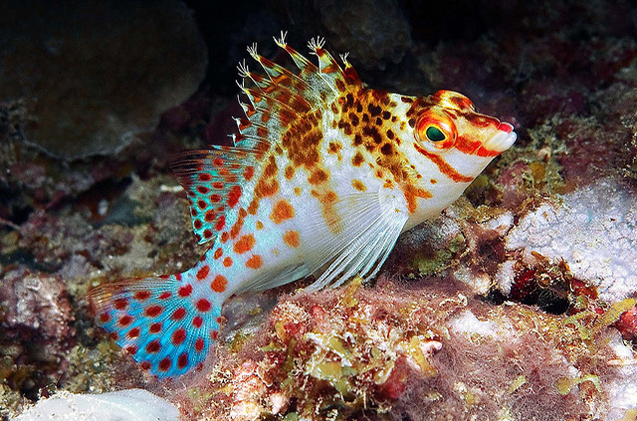

Falco’s Hawkfish
Behavior:
The Falco’s Hawkfish will spend much of its time perched, looking over the reef. It is a very hardy fish but is often aggressive towards smaller fish and new fish added to the aquarium. It is best added to the aquarium as one of the last fish introduced.
The Falco’s Hawkfish should not bother coral or clams, but will eat small ornamental shrimp and small fish. It is best kept singly in smaller aquariums, or as a pair in larger aquariums. Keep it with other semi-aggressive fishes. It should not be kept with other Hawkfish.
Feeding:
Offer the Falco’s Hawkfish a mixed diet of mysis shrimp and finely chopped meaty foods 4-6 times per week. Soaking all fish food with vitamins will help keep your fish healthier and make them less susceptible to disease. We recommend soaking food in garlic as well when adding new fish and whenever your notice ich or other disease in the aquarium. Garlic will help repel external parasites and will boost the fishes immunity.
Feeding Tips:
Remember to feed slowly. Leftover food will cause nitrates and phosphates to rise. If you see food falling to the sand bed and into the rocks you should feed slower and give the fish a chance to eat before adding a little more. Using a turkey baster allows you to target food to different fish. For example you can feed the aggressive fish on one side of the tank and then squirt a little bit on the other side for the less aggressive fish. This way all the fish get a chance to eat enough.
Maximum Length:
2.5"Care Level:
EasyFamily:
CirrhitidaeReef Compatibility:
Add with cautionMinimum Aquarium Size:
30 gal.Origin:
Fiji, Indo PacificDiet:
CarnivoreWater Conditions:
75-80° F; sg 1.024-1.026 (1.025 is ideal); pH 8.1-8.4 Ca 420-440 ppm, Alk 8-9.5 dKH, Mg 1260-1350, Nitrates <10ppm, Phosphates, < .10ppm
Water Chemistry:
Maintaining Ammonia at 0 ppm, Nitrites at 0 ppm, and Nitrates below 10ppm will help to keep your Falco’s Hawkfish happy and healthy. We recommend doing a water change soon after Nitrates rise above 10 ppm. Maintaining proper calcium (420-440 ppm), alkalinity (8-9.5 dkh – run it 7-8 if you are carbon dosing), and magnesium levels (1260-1350 ppm) will help to keep pH stable in the 8.1-8.4 range. We recommend a specific gravity of 1.024-1.026 with 1.025 being ideal for fish. Temperature should remain stable as well and should stay within a 2 degree range.